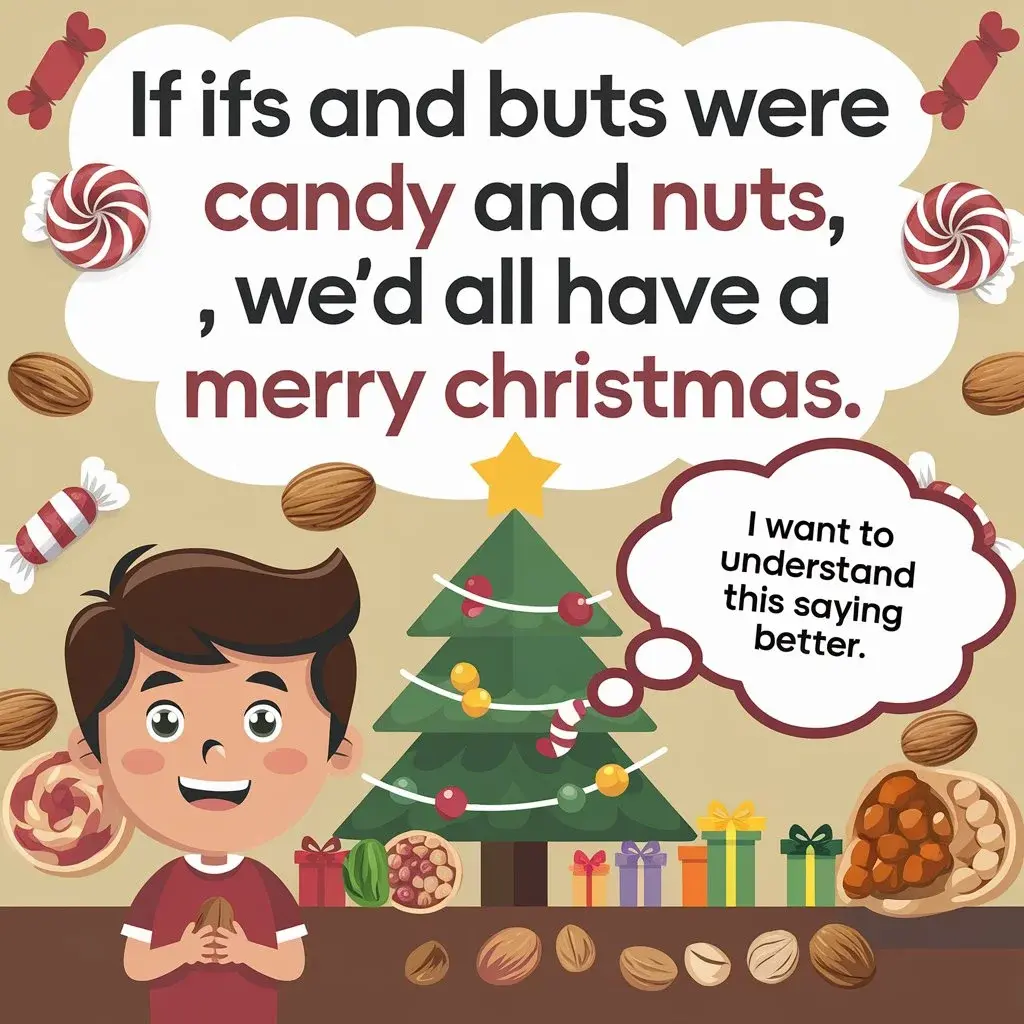Proverbs and idiomatic expressions are a critical stepping stone in advancing your English language skills. Today, we’ll delve into the meaning and origin of the expression, “if ifs and buts were candy and nuts, we’d all have a Merry Christmas.” Understanding idiomatic expressions like “If ifs and buts were candy and nuts” is essential for mastering the nuances of the English language.
This saying humorously points out the futility of dwelling on regret or wishful thinking, encouraging us to focus on reality. Commonly used in both casual conversation and media, it reflects the idea that excuses and wishes don’t bring about change. By learning this idiom, you can enrich your vocabulary and improve your communication skills.
Let’s dive into its meaning, origin, and how it can be applied in various situations.
What Does “If Ifs and Buts Were Candy and Nuts” Mean?
The saying “if ifs and buts were candy and nuts, we’d all have a Merry Christmas” humorously expresses the idea that if every wish, excuse, or speculation (often introduced by words like “if” or “but”) could bring something pleasurable like candy and nuts, then life would always be easy and delightful. However, it also acknowledges that this is far from the reality. In life, no matter how much we wish or regret, “ifs” and “buts” don’t magically solve problems.
Essentially, it’s a playful reminder that constantly speculating on “what could have been” or making excuses will not change anything. It pokes fun at the futility of wishful thinking.
Origin of the Saying
The origin of this phrase comes from a much older nursery rhyme, “If wishes were horses, then beggars would ride.” The idea behind the rhyme is similar: if all our wishes could become reality, life would be easy and free from struggles. The proverb highlights how wishing alone doesn’t achieve anything.
This saying was brought into modern popularity by former NFL quarterback Don Meredith during a 1970 broadcast of Monday Night Football. After one of his fellow commentators speculated about Los Angeles winning, Meredith responded with, “If ifs and buts were candy and nuts, we’d all have a Merry Christmas.” The phrase became his catchphrase, cementing its place in modern American vernacular.
Though the original nursery rhyme dates back to the 17th Century, with early references even in 1513 by Sir Thomas More, it was Meredith’s use that made the phrase widely popular in the modern era.
A Popular Idiom in TV History
Since its rise in the 1970s, the idiom has been used across various TV shows and media, often in comedic settings to point out someone’s wishful thinking or regret. Let’s explore a few examples.
Sheldon Cooper in The Big Bang Theory:
- Neil DeGrasse Tyson: “But I actually didn’t demote Pluto…”
- Sheldon Cooper: “If ifs and buts were candy and nuts, we’d all have a Merry Christmas. Think about that, Dr. Tyson.”
Here, Sheldon uses the saying in response to Tyson’s “but,” emphasizing that simply regretting the situation won’t change the outcome. Sheldon suggests that if buts could give us what we wanted, life would be easy, but it’s not that simple.
Homer Simpson in The Simpsons:
- Marge: “But Balzac is the name.”
- Homer: “If ifs and buts were candy and nuts—Uh, how does the rest of that go?”
In this humorous moment, Homer Simpson attempts to use the saying but humorously forgets how to finish it, reinforcing his character’s portrayal as simple-minded.
Dwight Schrute in The Office:
- Dwight: “If onlys and buts were candys and nuts, then every day would be Erntedankfest.”
Dwight Schrute, known for his eccentric personality, modifies the saying slightly by using “onlys” instead of “ifs” and refers to Erntedankfest (the German Harvest Festival) rather than Christmas, adding to his quirky character.
Variations of “If Ifs and Buts Were Candy and Nuts”
There are several variations of this saying that retain the same core message but substitute candy and nuts with other pairs. Here are some examples:
- “If ifs and buts were apples and nuts”: This variation simply swaps out candy for a healthier alternative, apples. The meaning remains the same.
- “If ifs and ands were pots and pans”: This version replaces buts with ands, emphasizing regret or missed opportunities with both ifs and ands.
- “If ifs and buts were coconuts”: In this case, both candy and nuts are replaced by coconuts, but the meaning and structure of the phrase remain intact.
- “If ifs and buts were whiskey and nuts”: This version is more suited to adult conversation, implying that if every wish and regret could bring whiskey, life would be much more enjoyable for adults.
- “If ifs and buts were bolts and nuts”: This saying is often used in trade industries, where bolts and nuts are common and practical items. It suggests that if ifs and buts could be resolved as easily as assembling with bolts and nuts, life would be easier for tradespeople.
How to Use “If Ifs and Buts Were Candy and Nuts” in a Sentence
Now that we’ve explored the variations and meanings, let’s look at how you might use this expression in conversation. You should use it when someone expresses regret, wishful thinking, or excuses involving ifs or buts. Here are some examples:
- “If only I could see her again.”
- Response: “If ifs and buts were candy and nuts, we’d all have a Merry Christmas.”
- “But you promised!”
- Response: “If ifs and buts were candy and nuts, we’d all have a Merry Christmas.”
- “If I don’t get the right grade, I won’t get in!”
- Response: “If ifs and ands were pots and pans, we’d all have a feast.”
Related Sayings
Finally, there are a few similar sayings that also capture the idea of wishful thinking:
- “If wishes were fishes, we’d all swim in riches.”
- “If wishes were horses, then beggars would ride.”
These related sayings express a similar sentiment: that simply wishing for something doesn’t make it happen.
FAQs
What does “If ifs and buts were candy and nuts” mean?
The phrase “If ifs and buts were candy and nuts” humorously suggests that if every excuse or wishful thought came true, life would always be enjoyable and full of pleasure. It highlights that simply wishing for things doesn’t lead to real-world results, and regrets won’t change what has already happened.
Where does this phrase originate from?
The saying originates from the old nursery rhyme “If wishes were horses, then beggars would ride,” dating back to the 17th century. Former NFL quarterback Don Meredith popularized it in 1970 on Monday Night Football, making it a widely recognized phrase in modern-day English.
How can I use this idiom in everyday conversation?
You can use this idiom when someone expresses regret or makes an excuse starting with “if” or “but.” For example, if a friend says, “But I didn’t mean to miss the event,” you can reply, “If ifs and buts were candy and nuts, we’d all have a Merry Christmas,” to humorously point out that wishing won’t change the outcome.
Are there any variations of this phrase?
Yes, there are several variations, including “If ifs and buts were apples and nuts,” “If ifs and buts were coconuts,” and “If ifs and ands were pots and pans.” Each variation carries the same meaning but uses different words for a fresh take on the phrase.
Is this idiom used in modern media?
Absolutely! The idiom has been used in popular TV shows like The Big Bang Theory, The Simpsons, and The Office. These shows often use it to add humor to situations where characters express regret or wishful thinking, further embedding the phrase into popular culture.
Why is understanding idioms important in learning English?
Idioms like this one help you grasp the cultural context of a language and improve your ability to engage in conversational English. They allow you to communicate more naturally and are often used to add humor or color to dialogue, making your speech more relatable and authentic.
Conclusion
Learning idioms such as “If ifs and buts were candy and nuts” gives you a unique insight into the humor and wisdom of the English language. By understanding this phrase, you not only enhance your vocabulary but also gain a deeper appreciation of its cultural context. Idioms make conversations richer and more engaging, offering playful ways to deal with excuses or wishes. As you continue to expand your knowledge of idioms, remember: “Words are the dress of thoughts.” So, use them wisely to express your ideas effectively and creatively.

I’m Mira Sinclair, the expert helping you navigate grammar sections at “Grammer Grove.” Playing with words and expressions is my thing. At Grammer Grove, we’re here to make yourwriting stand out and shine. Let’s make your appreciation heartfelt and memorable—come and join the fun at Grammer Grove!












